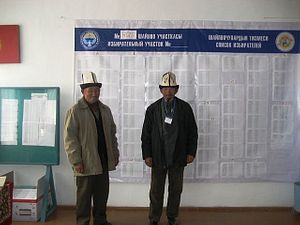On October 4, Kyrgyzstani citizens will head to the polls for parliamentary elections. Not only are the elections seen as something of a referendum on President Almazbek Atambayev’s stewardship, but they present, as RFE/RL’s Bruce Pannier reported, “arguably, the most important elections in Central Asia’s post-Soviet history.” With over a dozen parties vying for slots, and with an updated biometric roll, the elections pose the closest approximation to democratic elections the region knows – a testament, if nothing else, to the relative health of Kyrgyzstani politics.
That said, however, the free and potentially fair election won’t come without myriad misgivings. A detailed report from the International Crisis Group (ICG), released earlier this week, delineates all the room for improvement remaining within Kyrgyzstan’s political sphere. (Disclaimer: I worked with ICG in 2014.) Five years after Kyrgyzstan’s second revolution installed a new governing system, the structure has remained largely in place – but a series of factors, per Crisis Group, have led to “growing disillusionment with the only semi-functional parliamentary system.”
The realities pushing Kyrgyzstan’s recent stall – both political and economic – are numerous. As ICG lists:
Relations with the West have soured. The country is increasingly dependent, politically and economically, on Russia, becoming a full-fledged member of the Russia-led Eurasian Economic Union in August 2015. The government struggles to control the south, where tensions between Kyrgyz and Uzbeks, the largest minority, have not dissipated since ethnically motivated deadly violence in Osh five years ago. Border skirmishes with Uzbekistan and Tajikistan are not uncommon. The Kyrgyz nationalist narrative that emerged after the Osh pogroms is now firmly entrenched and facilitated by a variety of groups across the country. Pockets of religious radicalisation and intolerance, sometimes presented as traditional Kyrgyz values, are also a challenge. Instead of confronting these trends, political parties are incorporating them.
And it is in this incorporation, rather than their rebuttal, that ICG details a pair of “serious problems” that Bishkek has thus far failed to adequately address. Kyrgyz ethnic nationalism, which helped fuel the 2010 riots, has continued, especially among the country’s governing structures in the south. If anything, the support for these ethnic calls has only increased, without sufficient political pushback. Still, if there’s something of a silver lining, mainstream political parties haven’t entirely incorporated such rhetoric into their platforms: “In Crisis Group interviews, however, leaders of seven nationalist groups each professed to respect the country’s multiethnic nature; some said Kyrgyz nationalism could be modernized.”
The other undercurrent shifting political realities in Kyrgyzstan stems from the rise, both current and future, of political Islam. While parties remain ineligible from organizing around religious (or ethnic) characteristics, the role of political and politicized Islam will only increase as Kyrgyzstan moves forward. Per the report, “A UN specialist on democracy and governance said, ‘we see the influence of Islam in this parliament, more than ever … secularism is already troubled’.” Bishkek has paid little heed to potential incorporation of Islamic trends moving forward, to its potential detriment.
Aside from the coming election, economic struggles will only layer further strain on Bishkek. As the report notes, remittances to Kyrgyzstan have dropped some 40 percent from the first quarter of 2014 through the first quarter of 2015 – equivalent to over 12 percent of Kyrgyzstan’s GDP. Considering the World Bank just dropped the 2016 GDP outlook for Russia, on whom Kyrgyzstan largely relies for remittances, the trend will almost certainly accelerate – and will only add more pressure to these elections. And seeing as how “[the] elections, particularly if viewed as botched in any way, could provoke a wave of popular discontent with nationalist overtones,” the economic strictures will only exacerbate the stresses weighing the coming elections.

































